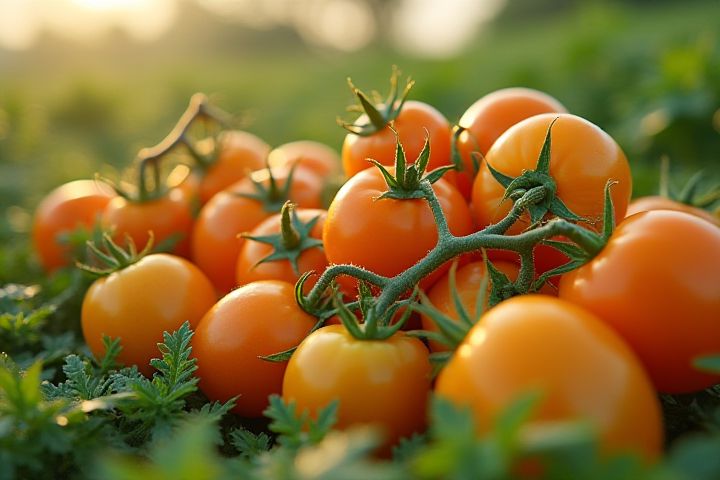
Nigeria boasts a rich diversity of agricultural products that are key to its economy and food security. Major staples include cassava, which serves as a primary carbohydrate source, and yam, renowned for its nutritional value and culinary versatility. Oil palm, indigenous to Nigeria, is a leading agricultural export, contributing significantly to both local consumption and international markets. Other vital crops include groundnuts, known for their oil content, and cocoa, which places Nigeria among the world's top producers. Investing in these agricultural sectors can enhance your understanding of Nigerian agriculture and its economic potential.
Cassava
Cassava is a staple crop in Nigeria, renowned for its versatility and high yield, making it a cornerstone of food security and economic stability. This drought-resistant tuber is utilized in various forms, such as garri, fufu, and flour, appealing to diverse culinary needs across the nation. With an impressive production capacity, Nigeria stands as the largest producer of cassava globally, contributing significantly to both local consumption and export opportunities. The cultivation and processing of cassava not only empower rural communities but also enhance the agricultural sector's resilience against climate change.
Maize
Maize is a staple crop in Nigeria, contributing significantly to the country's agriculture and economy. Known for its versatility, it serves as a key ingredient in various local dishes, as well as animal feed. The favorable climate and fertile soils in regions like the Northern and Middle Belt provide ideal conditions for maize cultivation, leading to high yields. Investing in maize farming not only enhances food security but also presents lucrative trading opportunities within both local and international markets.
Rice
Rice is one of the most important agricultural products in Nigeria, serving as a staple food for millions of people. The country boasts a variety of rice such as Tonkwase, Aromatic, and local varieties that thrive in diverse climatic conditions across regions like Kano and Ebonyi states. Nigeria aims to become self-sufficient in rice production, reducing the reliance on imports through initiatives promoting local farming and innovation. Investing in sustainable farming practices and technology can significantly enhance yield and quality, ultimately contributing to food security and economic growth in the nation.
Yam
Yam, a staple food in Nigeria, holds significant cultural and economic importance, particularly in regions like the Middle Belt and Southeast. Known for its versatility, yam is utilized in a variety of traditional dishes such as pounded yam, yam porridge, and yam fries, making it a crucial source of carbohydrates for many households. With Nigeria being one of the largest producers of yam globally, sustainable farming practices and improved storage techniques are vital for enhancing yields and reducing post-harvest losses. The yam market not only supports local economies but also contributes to food security, as it is a key export product that boosts Nigeria's agricultural sector.
Oil Palm
Oil palm is one of Nigeria's most valuable agricultural products, contributing significantly to the nation's economy. The country's tropical climate and fertile soils are ideal for cultivating oil palm, with the Niger Delta and southeastern regions being the most productive areas. Your investment in oil palm processing can yield high returns, as the demand for palm oil continues to rise in both domestic and international markets. Beyond oil extraction, oil palm cultivation supports rural livelihoods and encourages sustainable agricultural practices, further enhancing its importance in Nigeria's agricultural sector.
Cocoa
Cocoa is one of Nigeria's most valuable agricultural products, ranking among the top producers globally. The country's diverse climatic conditions, particularly in the southern regions, create an ideal environment for high-quality cocoa cultivation. Cocoa farming not only contributes significantly to Nigeria's economy through exports but also provides employment for millions of smallholder farmers. Your awareness of the importance of sustainable farming practices can help in enhancing cocoa production and ensuring its economic viability for future generations.
Groundnuts
Groundnuts, also known as peanuts, are a vital agricultural product in Nigeria, contributing significantly to the country's economy. This versatile legume thrives in the northern regions, where the climate and soil conditions are ideal for cultivation. Groundnuts are rich in protein, healthy fats, and essential nutrients, making them a popular snack and ingredient in various dishes. Furthermore, the thriving groundnut oil industry adds value to the agricultural sector and supports local farmers by creating job opportunities and boosting their income.
Soybeans
Soybeans are among the leading agricultural products in Nigeria, notable for their high protein content and versatility in food production. The country has seen a substantial increase in soybean cultivation, driven by its demand in both domestic and international markets for products like oil and animal feed. You can benefit from the thriving soybean industry, which has become a vital component of Nigeria's agricultural economy, contributing to food security and employment. With a favorable climate and rich soil, Nigeria is poised to expand its soybean production, offering significant opportunities for farmers and investors alike.
Sorghum
Sorghum is a vital agricultural product in Nigeria, celebrated for its drought resistance and adaptability to various soil types. Rich in nutrients, it provides a significant source of carbohydrates, making it essential for food security in both rural and urban areas. It serves diverse purposes, including food for humans, livestock feed, and even biofuel production, contributing to the nation's economy. Farmers can capitalize on its low-input requirements and market demand, fostering sustainable agricultural practices that promote rural development.
Millet
Millet, a resilient cereal grain, thrives in Nigeria's diverse climatic conditions, particularly in the northern regions where it is a staple food. This drought-resistant crop is rich in nutrients, offering high protein, fiber, and essential vitamins, making it a valuable addition to the diet. Nigerian farmers cultivate various millet varieties such as Pearl Millet and Finger Millet, which are well-suited for local soil types and contribute significantly to food security. The growing demand for millet in both domestic and international markets underscores its economic importance, encouraging sustainable farming practices and enhancing the livelihoods of local farmers.
